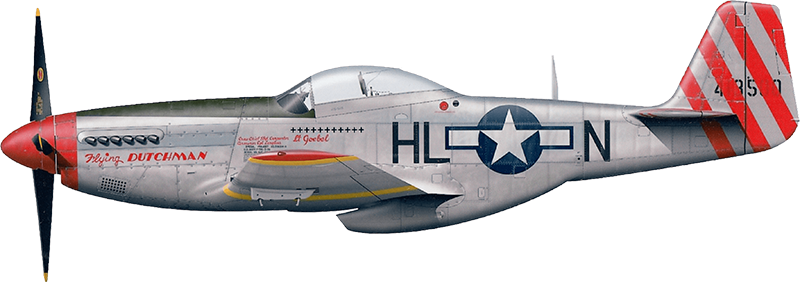Robert J. Goebel
February 28, 1923 – February 20, 2011
Bob Goebel was born and raised in Racine, Wisconsin. In 1942, at the age of nineteen, he enlisted in the U.S. Army Air Corps and applied for pilot training. He received his flight training at temporary bases in Corsicana, Greenville, and McAllen, Texas.
By the time Goebel was deployed in combat, the Air Force had become a separate branch of the military, and in the Spring of 1944 he joined the 31st Fighter Group in San Severo, Italy. The 31st FG had just transitioned to the new P-51 Mustang.
During a period of just six months, beginning in April 1944, Goebel completed sixty-one missions and scored eleven victories, earning him the coveted status of a double ace. When he returned home he was not yet twenty-two years old.
He married June Meany, his high school sweetheart and Racine native also, and during their sixty plus years of marriage, they raised nine children.
After the war Goebel earned a degree in physics from the University of Wisconsin, Madison, and served as commander in the Wisconsin Air National Guard. Later he moved his family to California and headed a team working on the Titan II rocket launch vehicle for the Gemini space program.
In 1966, Lt. Col. Robert Goebel retired from the Air Force and worked in the private sector for McDonnell Douglas, Northrop, and Aerojet Ordnance.
In 1991 Goebel penned his autobiographical work Mustang Ace: Memoirs of a P-51 Fighter Pilot, which had the distinction of being written by the Ace himself. The book was well-received, and resulted in many invitations to air shows and fighter ace forums to give talks and autograph his books, which continued until his death at his home in Torrance in 2011, one week shy of his 87th birthday.
We are a dying breed, the World War II aviator, and soon we will all be gone. I suppose there are those who will say, 'Good riddance,' not referring to us as individuals but to us as symbols of a barbaric and destructive way of settling disputes. War is destructive and frequently barbaric. But on the whole, I think the fighter combatants in Europe on both sides fought a gentleman's war, respecting each other and the unwritten conventions of individual mortal combat that had been observed since medieval times. World War II was a time when men could still boast, like St. Paul, that we had fought 'the good fight'.
Robert Goebel - Forward to Mustang Ace
